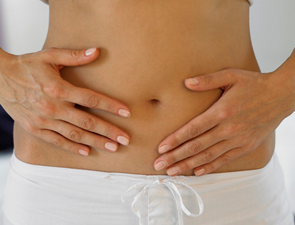Your Uterus
The uterus’s impact on “womanhood” is perhaps greater than that of any other organ. From your first period to pregnancy and menopause, life constantly reminds you of this most significant part of yourself.
 As you already know, your uterus is an incredibly dynamic organ that can expand dramatically to host a full-term pregnancy and then shrink back to just the size of a pear. It’s the heart of new life.
As you already know, your uterus is an incredibly dynamic organ that can expand dramatically to host a full-term pregnancy and then shrink back to just the size of a pear. It’s the heart of new life.
Every month, over the course of your menstrual cycle, the two innermost layers of your uterus go through several changes. In the weeks leading up to your period, as levels of estrogen rise in your blood (thanks to your ovaries), the lining of your uterus (the endometrium) and the layer of uterine muscle (the myometrium) begin to thicken and grow. They are thickest and engorged with blood vessels to nourish and sustain a fetus immediately after ovulation.
If fertilization does not occur, the levels of estrogen and progesterone in your blood decrease, which causes the uterus to shed its lining of blood and tissue through the cervix and vagina during menstruation.
Unfortunately, like all sophisticated equipment, your uterus may malfunction. Among the problems you could face are benign growths, called fibroids, which can cause pain and bleeding; endometriosis, a condition in which the tissue that forms the lining of the uterus grows outside it; bleeding problems; and prolapse, in which the uterus dips down from its normal position causing pain and discomfort. The conventional, most dramatic method for treating serious problems with the uterus is a hysterectomy, surgery to remove the uterus. However, in many cases surgery is entirely avoidable and you can treat problems with your uterus perfectly effectively with the natural approach.
Taking care of your uterus
Like all organs in your body, your uterus needs optimum nutrition and hormone balance to function efficiently and have healthy cells. Even when you don’t have a specific problem to treat, to this end you should follow the hormone-balancing diet and take herbal remedies such as raspberry leaf (Rubus idaeus) and pennyroyal (Mentha pulegium), both of which help your uterus. You can also take herbs and supplements that have beneficial effects on your hormone levels. Agnus castus (vitex agnus castus),milk thistle (Silybum marianum), and dandelion (Taraxacum officinale), as well as the B-vitamins and omega-3 fatty acids are all great for hormonal balance.
Cut down on your caffeine intake and try to steer clear of mucus-producing foods, such as dairy products and red meats, as they contribute to tissue congestion and inhibit your uterus’s ability to cleanse itself. Alcohol also negatively affects the uterus by contributing to inflammatory problems and interfering with your liver’s ability to remove estrogen.
Finally, you should get to know your body and watch for the signals it sends you. It goes almost without saying that your uterus is a fundamental piece of the puzzle when it comes to your menstrual cycle and your fertility. Learn what is “normal” for you and, if you need to, keep a written diary of your cycle, level of bleeding, and so on. If you show any signs of unusual bleeding or experience any unusual menstrual-like pain, let your doctor know about it right away.

